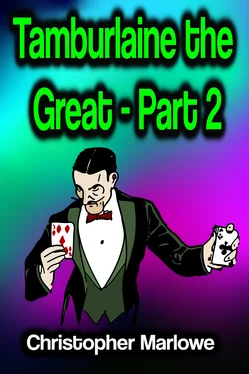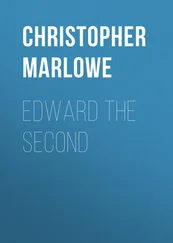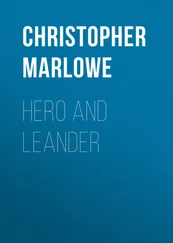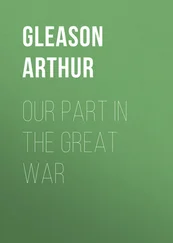THERIDAMAS. I left the confines and the bounds of Afric,
And made 60 a voyage into Europe,
Where, by the river Tyras, I subdu'd
Stoka, Podolia, and Codemia;
Then cross'd the sea and came to Oblia,
And Nigra Silva, where the devils dance,
Which, in despite of them, I set on fire.
]From thence I cross'd the gulf call'd by the name
Mare Majore of the inhabitants.
Yet shall my soldiers make no period
Until Natolia kneel before your feet.
TAMBURLAINE. Then will we triumph, banquet and carouse;
Cooks shall have pensions to provide us cates,
And glut us with the dainties of the world;
Lachryma Christi and Calabrian wines
Shall common soldiers drink in quaffing bowls,
Ay, liquid gold, when we have conquer'd him, 61 Mingled with coral and with orient 62 pearl.
Come, let us banquet and carouse the whiles.
[Exeunt.]
Enter SIGISMUND, FREDERICK, and BALDWIN, with their train.
SIGISMUND. Now say, my lords of Buda and Bohemia,
What motion is it that inflames your thoughts,
And stirs your valours to such sudden arms?
FREDERICK. Your majesty remembers, I am sure,
What cruel slaughter of our Christian bloods
These heathenish Turks and pagans lately made
Betwixt the city Zula and Danubius;
How through the midst of Varna and Bulgaria,
And almost to the very walls of Rome,
They have, not long since, massacred our camp.
It resteth now, then, that your majesty
Take all advantages of time and power,
And work revenge upon these infidels.
Your highness knows, for Tamburlaine's repair,
That strikes a terror to all Turkish hearts,
Natolia hath dismiss'd the greatest part
Of all his army, pitch'd against our power
Betwixt Cutheia and Orminius' mount,
And sent them marching up to Belgasar,
Acantha, Antioch, and Caesarea,
To aid the kings of Soria 63 and Jerusalem.
Now, then, my lord, advantage take thereof, 64 And issue suddenly upon the rest;
That, in the fortune of their overthrow,
We may discourage all the pagan troop
That dare attempt to war with Christians.
SIGISMUND. But calls not, then, your grace to memory
The league we lately made with King Orcanes,
Confirm'd by oath and articles of peace,
And calling Christ for record of our truths?
This should be treachery and violence
Against the grace of our profession.
BALDWIN. No whit, my lord; for with such infidels,
In whom no faith nor true religion rests,
We are not bound to those accomplishments
The holy laws of Christendom enjoin;
But, as the faith which they profanely plight
Is not by necessary policy
To be esteem'd assurance for ourselves,
So that we vow 65 to them should not infringe
Our liberty of arms and victory.
SIGISMUND. Though I confess the oaths they undertake
Breed little strength to our security,
Yet those infirmities that thus defame
Their faiths, 66 their honours, and religion, 67 Should not give us presumption to the like.
Our faiths are sound, and must be consummate, 68 Religious, righteous, and inviolate.
FREDERICK. Assure your grace, 'tis superstition
To stand so strictly on dispensive faith;
And, should we lose the opportunity
That God hath given to venge our Christians' death,
And scourge their foul blasphemous paganism,
As fell to Saul, to Balaam, and the rest,
That would not kill and curse at God's command,
So surely will the vengeance of the Highest,
And jealous anger of his fearful arm,
Be pour'd with rigour on our sinful heads,
If we neglect this 69 offer'd victory.
SIGISMUND. Then arm, my lords, and issue suddenly,
Giving commandment to our general host,
With expedition to assail the pagan,
And take the victory our God hath given.
[Exeunt.]
Enter ORCANES, GAZELLUS, and URIBASSA, with their train.
ORCANES. Gazellus, Uribassa, and the rest,
Now will we march from proud Orminius' mount
To fair Natolia, where our neighbour kings
Expect our power and our royal presence,
T' encounter with the cruel Tamburlaine,
That nigh Larissa sways a mighty host,
And with the thunder of his martial 70 tools
Makes earthquakes in the hearts of men and heaven.
GAZELLUS. And now come we to make his sinews shake
With greater power than erst his pride hath felt.
An hundred kings, by scores, will bid him arms,
And hundred thousands subjects to each score:
Which, if a shower of wounding thunderbolts
Should break out of the bowels of the clouds,
And fall as thick as hail upon our heads,
In partial aid of that proud Scythian,
Yet should our courages and steeled crests,
And numbers, more than infinite, of men,
Be able to withstand and conquer him.
URIBASSA. Methinks I see how glad the Christian king
Is made for joy of our 71 admitted truce,
That could not but before be terrified
With 72 unacquainted power of our host.
Enter a Messenger.
MESSENGER. Arm, dread sovereign, and my noble lords!
The treacherous army of the Christians,
Taking advantage of your slender power,
Comes marching on us, and determines straight
To bid us battle for our dearest lives.
ORCANES. Traitors, villains, damned Christians!
Have I not here the articles of peace
And solemn covenants we have both confirm'd,
He by his Christ, and I by Mahomet?
GAZELLUS. Hell and confusion light upon their heads,
That with such treason seek our overthrow,
And care so little for their prophet Christ!
ORCANES. Can there be such deceit in Christians,
Or treason in the fleshly heart of man,
Whose shape is figure of the highest God?
Then, if there be a Christ, as Christians say,
But in their deeds deny him for their Christ,
If he be son to everliving Jove,
And hath the power of his outstretched arm,
If he be jealous of his name and honour
As is our holy prophet Mahomet,
Take here these papers as our sacrifice
And witness of thy servant's 73 perjury!
[He tears to pieces the articles of peace.]
Open, thou shining veil of Cynthia,
And make a passage from th' empyreal heaven,
That he that sits on high and never sleeps,
Nor in one place is circumscriptible,
But every where fills every continent
With strange infusion of his sacred vigour,
May, in his endless power and purity,
Behold and venge this traitor's perjury!
Thou, Christ, that art esteem'd omnipotent,
If thou wilt prove thyself a perfect God,
Worthy the worship of all faithful hearts,
Be now reveng'd upon this traitor's soul,
And make the power I have left behind
(Too little to defend our guiltless lives)
Sufficient to discomfit 74 and confound
The trustless force of those false Christians!—
To arms, my lords! 75 on Christ still let us cry:
If there be Christ, we shall have victory.
[Exeunt.]
Alarms of battle within. Enter SIGISMUND wounded.
SIGISMUND. Discomfited is all the Christian 76 host,
And God hath thunder'd vengeance from on high,
For my accurs'd and hateful perjury.
O just and dreadful punisher of sin,
Let the dishonour of the pains I feel
In this my mortal well-deserved wound
End all my penance in my sudden death!
And let this death, wherein to sin I die,
Conceive a second life in endless mercy!
[Dies.]
Enter ORCANES, GAZELLUS, URIBASSA, with others.
Читать дальше












